英语语法第一课
小学英语语法 第一课

Miss Zhang
Every Week Oral English
• 初次见面问好: Nice to meet you. • 介绍自己: Hello! My name is ___. I am __ years oபைடு நூலகம்d. I like ___. I like playing basketball in the weekend.
名词的复数
• 一、名词复数规则 1.一般情况下,直接加-s,如:book-books, bag-bags, cat-cats, bed-beds 2.以s. x. sh. ch结尾,加-es,如:bus-buses, box-boxes, brushbrushes, watch-watches 3.以“辅音字母+y”结尾,变y为i, 再加-es,如:family-families, strawberry-strawberries 4.以“f或fe”结尾,变f或fe为v, 再加-es,如:knife-knives 5.不规则名词复数: man-men, woman-women, policeman-policemen, policewomanpolicewomen, mouse-mice ;child-children; foot-feet,; tooth-teeth fish-fish, people-people, Chinese-Chinese, Japanese-Japanese • 6.不可数名词没有复数形式,也可以说,它们单复数同形
疑问句
• 一般疑问句:Be +主语+其它。 如:-Are you a student? -Yes. I am. / No, I'm not. • 特殊疑问句:疑问词+一般疑问句。如:Where is my bike? • 否定句:主语+ don‘t( doesn’t ) +动词原形(+其它)。 如:I don't like bread. 当主语为第三人称单数时,要用doesn't构成否定句。如: He doesn't often play. 一般疑问句:Do( Does ) +主语+动词原形+其它。如: - Do you often play football? - Yes, I do. / No, I don't. 当主语为第三人称单数时,要用does构成一般疑问句。如: - Does she go to work by bike? - Yes, she does. / No, she doesn't. 特殊疑问句:疑问词+一般疑问句。如:How does your father go to work?
英语语法讲解第一课句子成分

英语语法讲解第一课句子成分爱尚英语入门第1课句子成分-定语七、定语.修饰或限制名词的词称为定语。
定语只和名词有关(这个很特殊,和其他任何句子成分无关)。
哪里有名词,哪里就有定语。
不管在什么语言里面,名词都是需要定语的(特殊情况除外)。
如果没有定语,名词的范围就太广了。
意思就不清楚了。
比如说:你去帮我买苹果。
这句话是有问题的,因为苹果这个名词,没有定语,概念太广了,表示世界上所有的苹果。
如果这样跟别人说话,别人根本不理解,让我买多少苹果啊,什么苹果啊?所以要加上一个定语:你去帮我买十个苹果。
这样意思就清楚了,“十个”就是修饰名词“苹果”的,所以“十个”就是定语。
注意,在英语中,普通名词是可以归属的,一般来说,专有名词是不能归属的,除非有特殊情况。
汉语的定语,不管多长,都是放在前面的。
看看这个例子:我的书美丽善良的姑娘昨天晚上我买的书我经常建议你买的书英语中也有定语放在前面的,叫做介词定语。
另外还有后置定语,即放在名词后面修饰前面名词的定语。
汉语中没有后置定语的概念,所以受汉语的影响,大多数人觉得后置定语很难。
其实后置定语本身并不难,只是我们不习惯而已。
在英语里面能作前置定语的有:形容词性物主代词、形容词、名词所有格(’s)、数词、名词、量词、指示代词等等。
例如:1.形容词性物主代词作前置定语:my book我的书her pen她的钢笔 our teacher我们的老师2.形容词作前置定语:expensive book贵的书 good book 好的书 happy girl 快乐的女孩3.名词所有格(‘s)作前置定语: Nick's house 尼克的房子4.数词作前置定语:three books 三本书 Ten apples 十个苹果5.名词作前置定语:English book 英语书 room number房间号码6.量词作前置定语:a bottle of water 一瓶水7.指示代词作前置定语:this book这本书 that girl那个女孩注意,同一个普通名词,可以跟多个定语。
英语语法基础知识大全
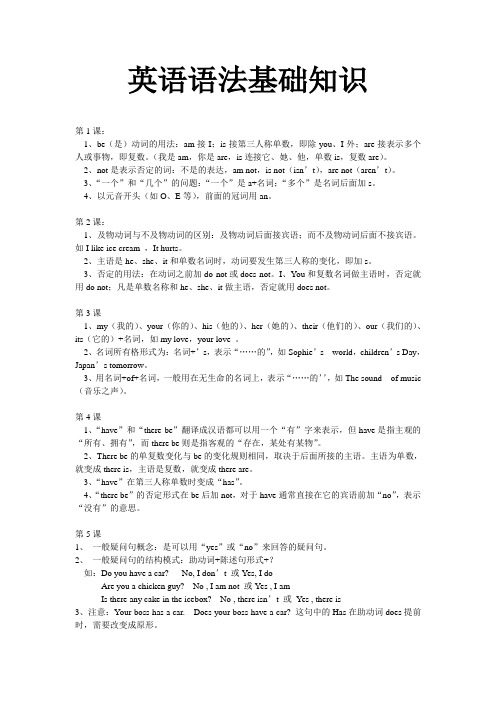
(1)have(has)+过去分词:Tom has gone out。
(2)现在完成时的否定和疑问形式:否定形式在have、has后加not;疑问形式将Have、has提前,如Has Tom gone out。
(3)过去分词的概念及其变化形式:
概念:它和现在进行时中的“动词的ing形式”一样,只是英语中表达时态的一种固定形式。
1、主语+will+动词原形,如:You will be rich。
主语+be going to+动词原形,如He is going to buy a car。
2、否定形式:
主语+will not(won’t)+动词原形,如You will not be rich.
主语+be not going to+动词原形,如Tom is notgoing to quit smoking.
3、疑问形式:
Will +主语+动词原形+?如,Will you be rich?
Be+主语+going to+动词原形+?如,Are you going to study English?
第10课一般现在时
1、一般现在时的含义:进行一般性描述。
2、动词单数第三人称的变化规则:
(1)当主语是he、she、it和单数名词时,动词要发生第三人称的变化,即在词尾加s;
Certainly.
No,you can’t
No,you mustn’t.
Please don’t
May
表示允许,意为“能,可以”May I sit here?(我坐在这里,可以吗?)Yes,please.
英语语法,第1课,主系表结构入门,词汇热身
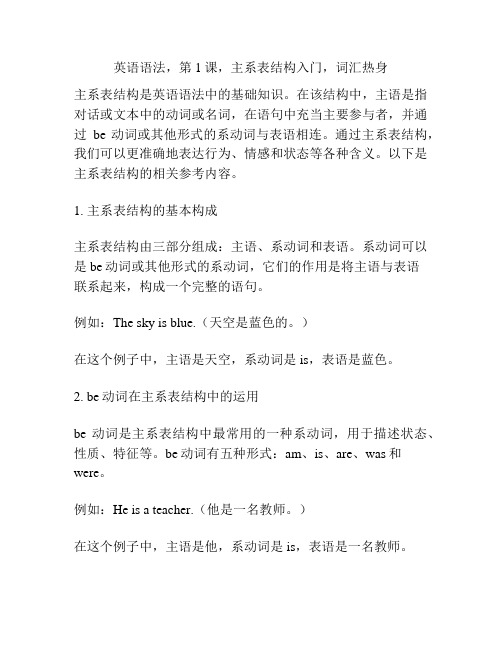
英语语法,第1课,主系表结构入门,词汇热身主系表结构是英语语法中的基础知识。
在该结构中,主语是指对话或文本中的动词或名词,在语句中充当主要参与者,并通过be动词或其他形式的系动词与表语相连。
通过主系表结构,我们可以更准确地表达行为、情感和状态等各种含义。
以下是主系表结构的相关参考内容。
1. 主系表结构的基本构成主系表结构由三部分组成:主语、系动词和表语。
系动词可以是be动词或其他形式的系动词,它们的作用是将主语与表语联系起来,构成一个完整的语句。
例如:The sky is blue.(天空是蓝色的。
)在这个例子中,主语是天空,系动词是is,表语是蓝色。
2. be动词在主系表结构中的运用be动词是主系表结构中最常用的一种系动词,用于描述状态、性质、特征等。
be动词有五种形式:am、is、are、was和were。
例如:He is a teacher.(他是一名教师。
)在这个例子中,主语是他,系动词是is,表语是一名教师。
3. 其他系动词在主系表结构中的运用除了be动词外,还有其他一些常用的系动词,如appear、get、become、seem、feel、look等。
例如:She looks happy today.(她今天看起来很开心。
)在这个例子中,主语是她,系动词是looks,表语是happy。
4. 主系表结构中的名词和形容词除了动词外,名词和形容词也可以作为表语出现在主系表结构中。
在这种情况下,系动词必须与表语的数和格相匹配。
例如:The book is interesting.(这本书很有趣。
)在这个例子中,主语是这本书,系动词是is,表语是interesting。
5. 主系表结构在疑问句和否定句中的应用主系表结构在疑问句和否定句中也可以使用,只需将be动词放在主语之前即可。
例如:Is he a teacher?(他是一名教师吗?)在这个例子中,主语是他,系动词是is。
例如:This book is not interesting.(这本书不有趣。
英语必学语法第一课——名词
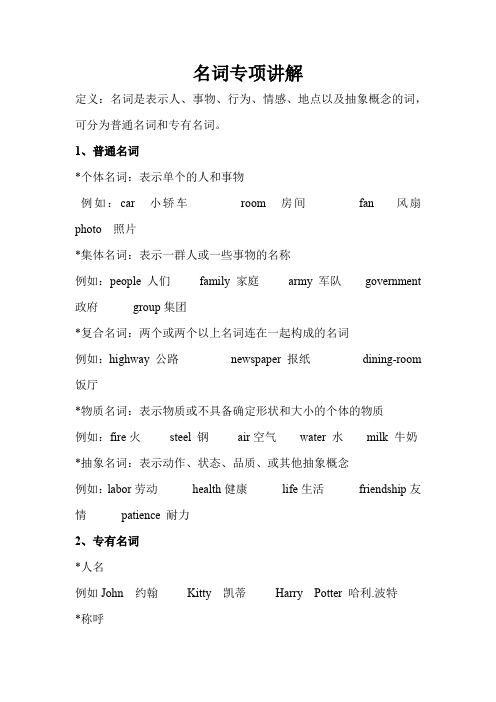
名词专项讲解定义:名词是表示人、事物、行为、情感、地点以及抽象概念的词,可分为普通名词和专有名词。
1、普通名词*个体名词:表示单个的人和事物例如:car 小轿车room 房间fan 风扇photo 照片*集体名词:表示一群人或一些事物的名称例如:people 人们family 家庭army 军队government 政府group集团*复合名词:两个或两个以上名词连在一起构成的名词例如:highway 公路newspaper 报纸dining-room 饭厅*物质名词:表示物质或不具备确定形状和大小的个体的物质例如:fire火steel 钢air空气water 水milk 牛奶*抽象名词:表示动作、状态、品质、或其他抽象概念例如:labor劳动health健康life生活friendship友情patience 耐力2、专有名词*人名例如John 约翰Kitty 凯蒂Harry Potter 哈利.波特*称呼例如:Mr.Brown 布朗先生Miss Fang 方小姐*品牌例如:Teddy Bear 泰迪熊*月份例如:January一月February二月March三月*星期例如:Sunday星期一Monday星期二Tuesday星期三*节日例如:Christmas圣诞节the Children’s Day 儿童节*建筑、公园、车站、路名例如:the Great Wall长城the Century Park世纪公园Yan’an Rord延安路ZhongShan Park Station 中山公园站*学科、语言例如:China中国Australia澳大利亚Nanjing南京Beijing北京二、名词还分为可数名词和不可数名词1、可数名词:能够以数目来计算,可以分为个体的人或者东西单数:数量是1,如:a cow (一头牛),a book(一本书),an apple (一个苹果)等。
An用于以元音音素开头的名词之前,a用于以辅音音素开头的名词之前复数:数量超过一,如tow pens(两支钢笔),four pigs(四头猪),some boys (一些男孩)等。
英语语法第一课 英语九大词类第一类 名词
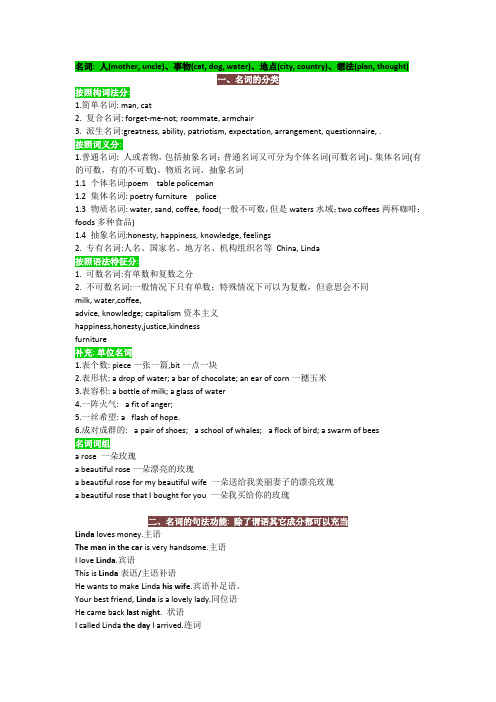
名词: 人(mother, uncle)、事物(cat, dog, water)、地点(city, country)、想法(plan, thought)1.简单名词: man, cat2. 复合名词: forget-me-not; roommate, armchair3. 派生名词:greatness, ability, patriotism, expectation, arrangement, questionnaire, .1.普通名词: 人或者物,包括抽象名词;普通名词又可分为个体名词(可数名词)、集体名词(有的可数,有的不可数)、物质名词、抽象名词1.1 个体名词:poem table policeman1.2 集体名词: poetry furniture police1.3 物质名词: water, sand, coffee, food(一般不可数,但是waters水域;two coffees两杯咖啡;foods多种食品)1.4 抽象名词:honesty, happiness, knowledge, feelings2. 专有名词:人名、国家名、地方名、机构组织名等China, Linda1. 可数名词:有单数和复数之分2. 不可数名词:一般情况下只有单数;特殊情况下可以为复数,但意思会不同milk, water,coffee,advice, knowledge; capitalism资本主义happiness,honesty,justice,kindnessfurniture1.表个数: piece一张一篇,bit一点一块2.表形状: a drop of water; a bar of chocolate; an ear of corn一穗玉米3.表容积: a bottle of milk; a glass of water4.一阵火气: a fit of anger;5.一丝希望: a flash of hope.6.成对成群的: a pair of shoes; a school of whales; a flock of bird; a swarm of beesa rose 一朵玫瑰a beautiful rose一朵漂亮的玫瑰a beautiful rose for my beautiful wife 一朵送给我美丽妻子的漂亮玫瑰a beautiful rose that I bought for you 一朵我买给你的玫瑰Linda loves money.主语The man in the car is very handsome.主语I love Linda.宾语This is Linda表语/主语补语He wants to make Linda his wife.宾语补足语。
初中基础语法(第一课 词法概述)

初中基础语法(第一课词法概述)第一部分词法一、词法内容概述1、词法主要研究各种词类的形式及其用法。
词类分为实词(名词、代词、形容词、数词、动词、副词)虚词(冠词、介词、连词、感叹词)2、英语词汇四种重要的形式变化(1)名词有单数、复数的变化。
(2)代词有主格、宾格、所有格等的变化。
(3)动词有人称、时态、语态等形式的变化。
(4)形容词和副词有比较级和最高级的变化。
二、英语构词法(Word Formation)(一)合成法(compound)把两个或两个以上的词合在一起而构成一个新词,这种构词法称为合成法。
(合成名词/形容词/副词/代词/动词)(二)派生法(derivation)在一个单词(词根)前或后加上一个词缀,构成一个新词,这种构词法称为派生法。
词缀分为前缀和后缀。
1、前缀(1)表示否定或相反的含义un- 形容词unhappy不高兴的、副词unusually不同寻常地、动词uncover揭开dis- 形容词dishonest不诚实的、动词dislike不喜欢、名词discomfort不适mis-动词misunderstand误解im-形容词impossible不可能的in-形容词incorrect不正确的ir-形容词irresponsible不负责任的(2)表示重复re-动词rewrite 重写(3)表示“使”en-动词enrich 使富有2、后缀(1)名词后缀-er teacher老师hunter猎人reader读者-or actor男演员director导演imventor发明家-ress actress女演员waitress女服务员-ese Japanese日本人Chinese 中国人-an Canadian加拿大人Australian澳大利亚人American美国人-ist artist艺术家pianist钢琴家typist打字员-ent agreement同意movement 运动treatment对待-ion operation手术celebration庆祝congratulation祝贺-ship friendship友谊leadership领导职位relationship关系scholarship奖学金-hood boyhood少年时代childhood儿童时代-th truth真理youth年轻人warmth温暖-dom freedom自由wisdom智慧kingdom王国-ing building建筑物,楼房feeling感觉dancing舞蹈-ness kindness和蔼illness疾病brightness明亮(2)形容词后缀-able/-ible comfortable 舒适的;enjoyable 令人愉快的responible 负责的-al natural 自然的musical 音乐的national 国家的-ic/-ical-ish-ful-less-ly-en-y-en-y-ous-ed-ing-ward(3)副词后缀-ly-ward/-wards(4)动词后缀-en(三)转化法(converdion)1、一般情况下,转化前后的单词读音不变,只转换词性。
七年级上册英语第一课语法重点
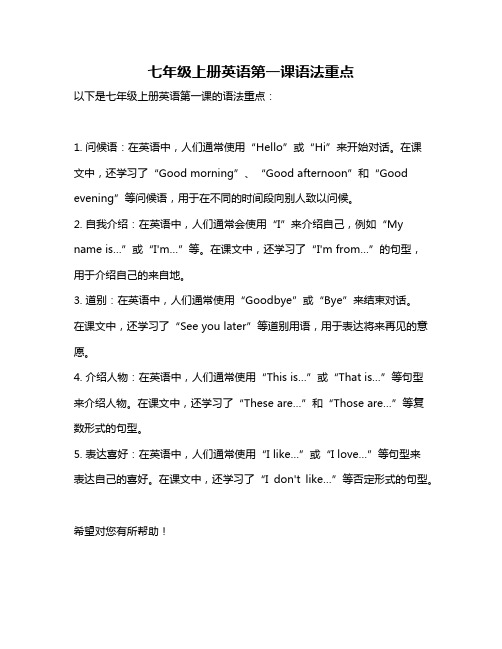
七年级上册英语第一课语法重点
以下是七年级上册英语第一课的语法重点:
1. 问候语:在英语中,人们通常使用“Hello”或“Hi”来开始对话。
在课
文中,还学习了“Good morning”、“Good afternoon”和“Good evening”等问候语,用于在不同的时间段向别人致以问候。
2. 自我介绍:在英语中,人们通常会使用“I”来介绍自己,例如“My name is…”或“I'm…”等。
在课文中,还学习了“I'm from…”的句型,
用于介绍自己的来自地。
3. 道别:在英语中,人们通常使用“Goodbye”或“Bye”来结束对话。
在课文中,还学习了“See you later”等道别用语,用于表达将来再见的意愿。
4. 介绍人物:在英语中,人们通常使用“This is…”或“That is…”等句型来介绍人物。
在课文中,还学习了“These are…”和“Those are…”等复数形式的句型。
5. 表达喜好:在英语中,人们通常使用“I like…”或“I love…”等句型来
表达自己的喜好。
在课文中,还学习了“I don't like…”等否定形式的句型。
希望对您有所帮助!。
第一课英语语法

Unit 1短语收藏夹Prefer...to... 喜欢……胜过于……Hold...up 抬起;举起Go to sb for help 找某人帮忙At once 立即;马上As well as 和……一样;既……又……as a matter of fact 实际上;其实come out of ... 从……出来the key to ... ……的关键in many situations 在很多种情况下a lack of 缺少close to 靠近;接近talk with sb 与某人交谈in concentration 专心地in a clever way 以一种聪明的方法stare at sb 凝视某人make eye contact 与某人目光接触语法梳理1.It can be the key to successful communication. (P4) 它会是成功交流的关键。
解析:the key to...“……的关键,……的钥匙”。
介词to在此表示“的”之意,但不能用of替换。
例如:Working hard is the key to success.努力学习是成功的关键。
2.It can show whether a person is friendly or unfriendly, ...(P4)它可以表明一个人是友好的还是不友好的,……解析:whether 意为“是否”,在一般的宾语从句可与if互换,但在下列情况下通常用whether而不能用if:①引导表语从句时。
例如:The question is whether people will buy it.问题是人们是否会买它。
②后接不定式时。
例如:I don’t know whether to go.我不知道是否要去。
③与or 或or not连用时。
例如:I don’t know whether he will come or not.我不知道他是来还是不来。
大学生英语语法第一课教案
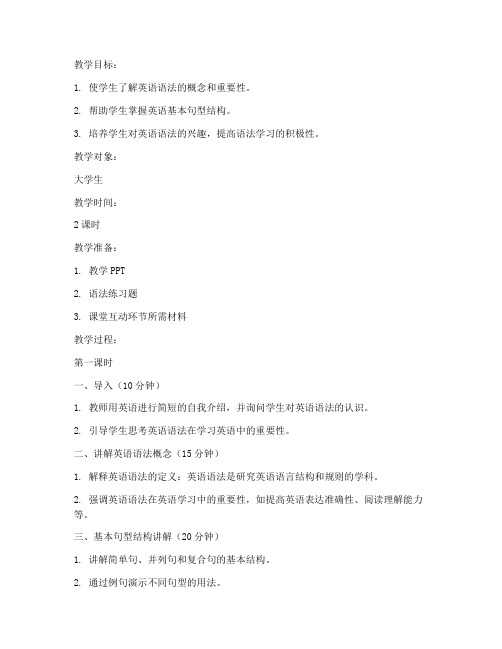
教学目标:1. 使学生了解英语语法的概念和重要性。
2. 帮助学生掌握英语基本句型结构。
3. 培养学生对英语语法的兴趣,提高语法学习的积极性。
教学对象:大学生教学时间:2课时教学准备:1. 教学PPT2. 语法练习题3. 课堂互动环节所需材料教学过程:第一课时一、导入(10分钟)1. 教师用英语进行简短的自我介绍,并询问学生对英语语法的认识。
2. 引导学生思考英语语法在学习英语中的重要性。
二、讲解英语语法概念(15分钟)1. 解释英语语法的定义:英语语法是研究英语语言结构和规则的学科。
2. 强调英语语法在英语学习中的重要性,如提高英语表达准确性、阅读理解能力等。
三、基本句型结构讲解(20分钟)1. 讲解简单句、并列句和复合句的基本结构。
2. 通过例句演示不同句型的用法。
四、课堂练习(15分钟)1. 学生根据所学内容,完成简单的语法练习题。
2. 教师对学生的练习进行点评和讲解。
五、总结(5分钟)1. 回顾本节课所学内容,强调重点和难点。
2. 布置课后作业,要求学生复习所学知识。
第二课时一、复习导入(10分钟)1. 回顾上节课所学内容,检查学生对基本句型结构的掌握情况。
2. 引导学生分享自己在课后练习中的收获和困惑。
二、语法难点讲解(20分钟)1. 讲解英语语法的难点,如时态、语态、非谓语动词等。
2. 通过例句和练习题,帮助学生理解和掌握难点。
三、课堂互动(15分钟)1. 学生分组进行英语对话练习,运用所学语法知识进行交流。
2. 教师对学生的对话进行点评和指导。
四、总结与布置作业(10分钟)1. 总结本节课所学内容,强调重点和难点。
2. 布置课后作业,要求学生复习所学知识,并完成相关练习题。
教学反思:1. 教师应根据学生的实际情况,调整教学进度和难度。
2. 注重培养学生的语法学习兴趣,提高学生的语法素养。
3. 鼓励学生积极参与课堂互动,提高学生的口语表达能力。
通过本节课的教学,使学生了解英语语法的概念和重要性,掌握英语基本句型结构,为后续的英语语法学习打下坚实基础。
初中英语语法初二第一课
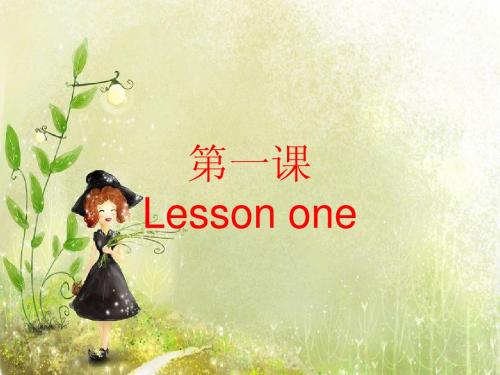
二 名词的分类 名词可以分为专有名词 专有名词( Nouns) 名词可以分为专有名词(Proper Nouns)和普通名词 (Common Nouns),专有名词是某个(些)人,地方, Nouns),专有名词是某个 ),专有名词是某 地方, 机构等专有的名称 等专有的名称。 机构等专有的名称。 专有名词 表示 人名、Bill 比尔 地名、China 中国 hill 山
把下列名词变为复数形式
German zoo woman Chinese pencil-box deer man doctor piano watch life tomato face roof fish sheep woman teacher brush story tooth boy baby page bus wife knife girl student child policeman house shop hero
3)of 前面的名词不能是专有名词。 如不说:this is John of his uncle's. 4)of 后面的名词必须是特定的。 如these books of my friend‘s are good 我朋友的这些书很好。 5)of 后面的名词必须是指人的名词。 比较不说it is a leaf of the tree's. a picture of my father指的是爸爸本人的照片。 注意of 所有格和双重所有格有时可以交替使用,意义无甚区别。 如a friend of my brother →a friend of my brother's
填表
专有名词 普通名词 人名 个体名词 地名 集体名词 节日 物质名词 月份 抽象名词 星期 报刊 机构 book 书 police 警察 youth 青春 Macao 澳门 the WTO 世贸组 织 key 钥匙 Green 格林 Singapore 新加坡 Mother’s Day 母亲节 December 十二月 class 班级 love 热爱 the Yellow River 黄河 Thanksgiving 感恩节 March 三月 foot 脚 deer 鹿
语法第一课笔记
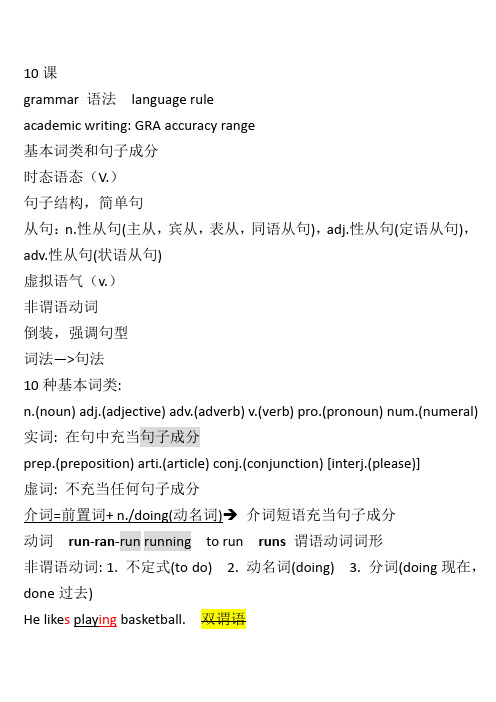
10课grammar 语法language ruleacademic writing: GRA accuracy range基本词类和句子成分时态语态(V.)句子结构,简单句从句:n.性从句(主从,宾从,表从,同语从句),adj.性从句(定语从句),adv.性从句(状语从句)虚拟语气(v.)非谓语动词倒装,强调句型词法—>句法10种基本词类:n.(noun) adj.(adjective) adv.(adverb) v.(verb) pro.(pronoun) num.(numeral) 实词: 在句中充当句子成分prep.(preposition) arti.(article) conj.(conjunction) [interj.(please)]虚词: 不充当任何句子成分介词=前置词+ n./doing(动名词) 介词短语充当句子成分动词run-ran-run running to run runs谓语动词词形非谓语动词: 1. 不定式(to do) 2. 动名词(doing) 3. 分词(doing现在,done过去)He like s play ing basketball.There are a lot of people [who believe (that) exhausts from cars can lead to air pollution].He runs fast and jumps high. He runs fast, and I jump high.9种句子成分:主语,谓语(系动词),宾语,表语-----主干成分定语,状语,补足语,同位语,插入语[….,( ),…. ]-----枝叶成分I love you.I am a girl.作主语: n. (pro., num.), doing, to do, 主语从句宾语(对象)动宾,介宾go to the park作宾语: n. (pro., num.), doing, to do, 宾语从句系动词(be)+(表述)语 主语1. 状态系动词: be2. 变化系动词: become, turn, go, come…3. 保持系动词: keep, stay, remain4. 感官系动词: sound, smell, taste, feel, look5. 表象系动词: seem, appear6. 终止系动词: end, prove, turn outThis plan proved/turned out infeasible.作表语: n. (pro., num.), doing, to do, adj. 介短, 表语从句同位语: n., 同位语从句the fact that +完整句子You cannot deny the fact (n.)== that our country is developing rapidly. This is my best friend,== Lucy.Our teacher,== Ms Lee, is going to ….We should learn from the past, ===the mirror of the present and the hope for the future.My cousin Tom is coming to see me.(限定)语→n.作定语: adj., n., doing, to do, 分词, 介词短语, 定语从句前置/后置: 单词放在前, 短语或从句结构放在后a big red cotton bag a cute woolen dollcredit carda boring game bore→ boring/bored interestThis experiment interested the students.He is smart. 作表语He is a smart boy. 作定语(状态)语→谓语动词(表时间,地点,原因,方式,伴随,结果,程度,目的…)作状语: adv., 介短, 分词, to do, 状语从句补足语: 宾补,主补作补语: adj., n., to do, 分词make sb. + adj. He made me mad.elect sb. + n. They elected Trump (to be) the president.v. sb. to do: You should ask him to help me.I can feel my heart beating fast.The main problem is [that the road becomes overcrowded].This phenomenon is strange.is strange.It is strange that people prefer to live in suburb.How we can reach the destination is not clear.Who will host the meeting is not clear.sentence: minimum completed meaning, structure; S-V句子的种类: function(陈述句,疑问句,感叹句,祈使句)/structure(简单句,并列句[分句1+分句2],复杂句[主句+从句])主句: main clause 从句: (subordinated) clause 分句: clause并列连接词: , FANBOYS, for, and, neither=and…not/nor, but, or, yet, soI will not stay at home, and I will not go out with you.==> neither will I go out with you.I bought a dress yesterday, and it is lovely.We have known each other for 4 years, yet we haven’t become friends (yet).从属连接词(从句的引导词)。
高中英语家教备课资料 高中英语基础语法第一课:音标

学习要求:会读即可长元音发音规则:发音要长,发音最好超过2秒钟。
/ɑ: / 感叹祖国长“啊”音/i: / 穿针引线长“衣”音/u: / 火车来了长“呜”音/ɔ: / 中嘴长“噢”音/ɜ: / 重读卷舌音短元音发音规则:发音要短,急促有力,收小腹。
/ʌ/ 尖尖“啊”音/ɪ/ 短“衣”音/u/ 短“呜”音/ɒ/ 短“噢”音/ə/ 打嗝音/e/ 小开口45度回答音/æ/ 大开口90度梅花“哎”音双元音发音规则:由两个单元音组成。
由第一个音滑向第二个音,重点在第一个音。
/ ai / 大嘴“阿姨”音(与“爱 ”同音)/ ei / 咧嘴音(嘴巴咧到耳上)/ ɔi / “噢一”音/ əʊ/ 舀水音/ au / 鬼哭狼嚎音/ ɪə/ ‘12’/ ʊə/ ‘屋鹅’/ eə/ ‘挨饿’单辅音爆破音:/ p / / b /弹齿音:/ t / / d /咳嗽音:/ k / / g /咬唇音:/ f / / v /摩擦音:/ s / / z /咬舌音:/θ/ / ð /用气音:/ ʃ/ / ʒ/双辅音/ ts /:用气说‘次’/ dz /:用气说‘子’/ ʧ /:用气说‘奇’/ ʤ /:用气说‘迹’/ tr /:用气说‘确’/ dr /:用气说‘绝’鼻音闭嘴鼻音:/ m /开嘴鼻音:/ n /撒娇鼻音:/ ŋ/半元音/w /: 用气说‘我’/ j /: 用气说‘爷’似鼻音/ l /: 用气说‘乐’/ h /: 狗喘气音‘呵’/ r / : 用气说‘若’找出所给单词划线字母与其他三个读音不同的单词()1. A. he B. bed C. leg D. get ()2. A. tea B.eat C. head D.seat ()3. A. duck B. bus C. blue D. hug()4. A. nice B. big C. six D. miss ACCA。
第一课 英语语法基础词性及 成分
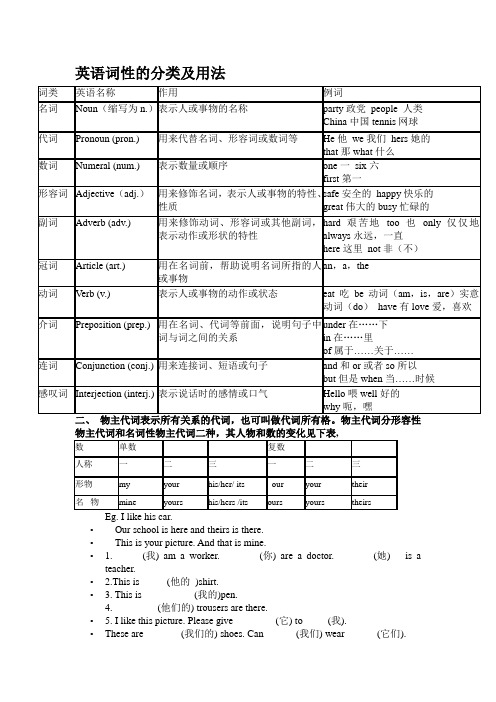
英语词性的分类及用法•Our school is here and theirs is there.•This is your picture. And that is mine.• 1.______(我) am a worker. _______(你) are a doctor. _______(她) is a teacher.• 2.This is_____ (他的)shirt.• 3. This is __________(我的)pen.4._________(他们的) trousers are there.• 5. I like this picture. Please give ________(它) to_____(我).•These are _______(我们的) shoes. Can ______(我们) wear ______(它们).句子成分;简单句、并列句和复合句一、句子成分(一)句子成分的定义:构成句子的各个部分叫做句子成分。
句子成分有主要成分和次要成分;主要成分有主语和谓语;次要成分有表语、宾语、定语、状语、补足语和同位语。
(二)主语:主语是一个句子所叙述的主体,一般位于句首。
但在there be 结构、疑问句(当主语不疑问词时)和倒装句中,主语位于谓语、助动词或情态动词后面。
主语可由名词、代词、数词、不定式、动名词、名词化的形容词和主语从句等表示。
例如:During the 1990s, American country music has become more and more popular.We often speak English in class.One-third of the students in this class are girls.To swim in the river is a great pleasure.Smoking does harm to the health.The rich should help the poor.When we are going to have an English test has not been decided.It is necessary to master a foreign language.(三)谓语:谓语说明主语所做的动作或具有的特征和状态。
第一课-英语语法基础词性及-成分

英语词性的分类及用法•Ourschool ishereandtheirs is there.•This is yourpicture.And that is mine.•1。
______(我)amaworker。
_______(你) are a doctor._______(她) is a teacher.•2。
Thisis_____ (他的)shirt.•3。
This is__________(我的)pen.4._________(他们的) trousersarethere。
•5。
I like this picture. Please give________(它) to_____(我).•These are _______(我们的) shoes.Can______(我们)wear ______(它们).句子成分;简单句、并列句和复合句一、句子成分ﻫ(一)句子成分的定义:构成句子的各个部分叫做句子成分。
句子成分有主要成分和次要成分;主要成分有主语和谓语;次要成分有表语、宾语、定语、状语、补足语和同位语。
ﻫ(二)主语:主语是一个句子所叙述的主体,一般位于句首.但在there be结构、疑问句(当主语不疑问词时)和倒装句中,主语位于谓语、助动词或情态动词后面。
主语可由名词、代词、数词、不定式、动名词、名词化的形容词和主语从句等表示。
例如:ﻫDuring the1990s,American countrymusic has becomemore andmorepopular。
ﻫWeoftenspeak Englishin class.ﻫOne-third of the students in this class aregirls.ﻫTo swim inthe river is a great pleasure。
Smoking does harm tothe health。
Therichshouldhelp thepoor.ﻫWhen we aregoingto have an English test has not been decided。
再回首英语语法-开学第一课

一词,一世界
1. It will take more than a year to build the subway.
2. It will take more than one year to build the subway.
一词,一世界
• Stand up! • Come up! • Cheer up!
B: I'm not sure. Where do you get a pig with one hand?
隔离:主谓隔离,动宾隔离,修饰隔离
晓其”异“
A man was standing at a bus stop eating fish and chips. An old lady and her litle white dog stood next to him. The dog, excited by the smell of the fish and chips, started to bark and jump up on the man's leg.
2. ”你不能去!“---” 我非去。“ I don't believe in no ghosts. (我不相信有什么鬼!)
3. You don't want to go out in such rotten weather(烂天气). It's better for you to stay at home to stretch your legs and do physical exercises.
kitchen. 退休老人在花园里栽玫瑰,老伴儿在厨房做着 世界
1. The gorilla(大猩猩) behaves like a man. 那大猩猩的行为举止像极了人。 2. The team behaves like one man. 这个队配合得像一个人。
- 1、下载文档前请自行甄别文档内容的完整性,平台不提供额外的编辑、内容补充、找答案等附加服务。
- 2、"仅部分预览"的文档,不可在线预览部分如存在完整性等问题,可反馈申请退款(可完整预览的文档不适用该条件!)。
- 3、如文档侵犯您的权益,请联系客服反馈,我们会尽快为您处理(人工客服工作时间:9:00-18:30)。
• 10. 感叹词(interjection, 缩写为inter.) 表示
感情。An interjection is a word or a phrase that expresses emotion or exclamation. • e.g oh; ah; ouch; well
• 注意:
1. 属于前六类的词(名、代、形、数、动、 副词)叫做实词(notional word)。它们 可以有词形变化,可以独立承担句子成分。 属于后四类的词(冠、介、连、感词)叫 做虚词(form word)。 2. 很多词可以词类跨界。如work(名词和动 词),sound(形容词词和名词)等。
语法的一些基本概念和定义:
• 1. 词类和句子成分
根据词的形式、意义及其在句子中的功用将 词分为若干类,叫做词类。一个句子由各 个功用不同的部分所构成,这些部分叫做 句子成分。
词类(Parts of Speech)
英语的词通常分为十大类: 1. 名词(noun, 缩写为n.)是人和事物的名 称。A noun is a word that names a person, a place, a thing, or an idea. e.g English; life; pen
• 2. Do you have my pencil?
have: 所有动词中使用次数最多的单词,表示 一种最普遍的所有关系。 英语中使用次数最多的动词:be, have, give, get have: 拥有----give:给予;get:得到(“拥 有”意义的延伸)
例句:
• 1. 我一点都不知道。 • I have no idea about it. • 2. 我向你保证。 • You have my word.
• 1. You are a good dancer.
"be" :表示状态的系动词。把所有的事物归 结为一种状态。当汉语中的句子需要用一 个甚至几个动词来表达的时候,我们先要 考虑是否可以用一种状态、一种性质的判 断来代替。
例句:
• 1. 给你。 • Here you are. • 2. 在这个行业是靠形象吃饭的。 • This business is all images. • 3. 我们说到哪了? • Where were we?
词类和句子成分的关系
• 在句子里,一定的句子成分由一定的词类
来担任。现将哪些句子成分通常由哪些词 类来担任列述如下: • 1. 主语:名词和代词 • 2. 谓语动词:动词 • 3. 表语:名词、代词和形容词
• 4. 宾语:名词和代词 • 5. 定语:形容词 • 6. 状语:副词
拟人句:赋予事物以生命。把所做的事情或 者是物体当成是句子的主体来表达,更加 形象、直接。
例句:
• 1. 你为什么叹气? • What does the sigh say? • 2. 我确实有过那个想法。 • That thought did cross my mind. • 3. 有什么烦心事? • What's eating you?
都有例外,不能照搬书本和死记硬背。
翻译句子:
• 1. 你舞跳得真好。 • 2. 你拿了我的铅笔吗? • 3. 儿子的鼻子像我。 • 4. 那首歌是怎么唱的? • 5. 我五天后回来。
大家的译文:
• 1. You dance very well. • 2. Did you take my pencil? • 3. My son's nose looks like mine. • 4. How do you sing that song? • 5. I'll come back in five days.
• 4. 原来是这么回事。 • That explains a lot. • 5. 是你要的结果吗? • Does it serve your purpose? • 6. 年龄不应该成为婚姻的障碍。 • Well,age shouldn't be something that
comes in the way of a person's marriage.
• 3. 你说了算。 • You have the final say. • 4. 我要点他正在喝(吃)的东西。 • Excuse me. I'll have what he's having. • 5. 你得这病多久了? • How long have you had it?
• 3. My son's nose is from me. • 5. I'll be back in five days.
• 1. 主语(subject)它是句子所要说明的人
或事物,是一句的主体。The subject is the part of the sentence that names whom or what the sentence is about.
谓语(predicate): The predicate is the part of the sentence that says something about the subject.
• 2. 代词(pronoun, 缩写为pron.)是用来代替
名词的词。A pronoun is a word that takes the place of a noun, a group of words acting as a noun, or another pronoun. • e.g we; his; this; all
• 4. 这些年你过得怎么样? • How have you been these years? • 5. 他一直支持我们,现在应该是我们支持
他的时候了。 • He's always being there for us. We'll be there for him now. • 6. 打搅,我觉得你们是坐了我们的位子了。 • Sorry, I think you may be in our seats.
• 4. 数词(numeral, 缩写为num.)是表示多少
和第几的词。A numeral is a word that denotes a number. • e.g one, two, three; first, second, third
• 5. 动词(verb, 缩写为v.)表示动作和状态。A
• 3. 形容词(adjective, 缩写为adj.)用来修饰
名词。An adjective is a word that modifies a noun or a pronoun by limiting its meaning. An adjective tells what kind, which one, how many, or how much. • e.g red; interesting; enough
(或代词)与句子里其他词的关系。A preposition is a word that shows the relationship of a noun or a pronoun to another word in a sentence. • e.g for; into; since; by
• 9. 连词(conjunction,缩写为conj.) 是连接词、
• 4. 他是我的顶头上司。 • He is above me. • 5. 微积分对我来说太难了。 • Calculus was always beyond me. • 6. 你打这个电话就能找到我。 • You can reach me at this phone number.
• 4. How does that song go?
from, in: 介词。介词在英语中使用频率高, 使用范围广,是英语的灵魂。它作为表达 方位的专用词汇,既能表达词汇的空间意 义,又能够被充分地扩展到表达更加广泛 的抽象意义上。
例句:
• 1. 这顿饭我请。 • Dinner is on me. • 2. 这是你我之间的秘密。 • It's a secret between you and me. • 3. 孩子们还没睡吗? • Are the kids still up?
English Grammar 英语语法 第一讲
1.语法是什么?(What is grammar?)
• 语法是语言的组织规律,它赋予语言以结
构系统。(the entire system of a language, including its syntax, morphology, semantics, and phonology) • syntax: 句法学;morphology: 词法学; semantics: 语义学;phonology: 语音学
verb is a word that expresses action or a state of being and is necessary to make a statement. • e.g be; hope; wave; think
• 6. 副词(adverb,缩写为adv.)是修饰形容词、
• 7. 冠词(article, 缩写为art.) 说明名词所指
的人或物的词。An article is a name for the (definite article) and a, an (indefinite article).
• 8. 介词(preposition,缩写为prep.) 表示名词
